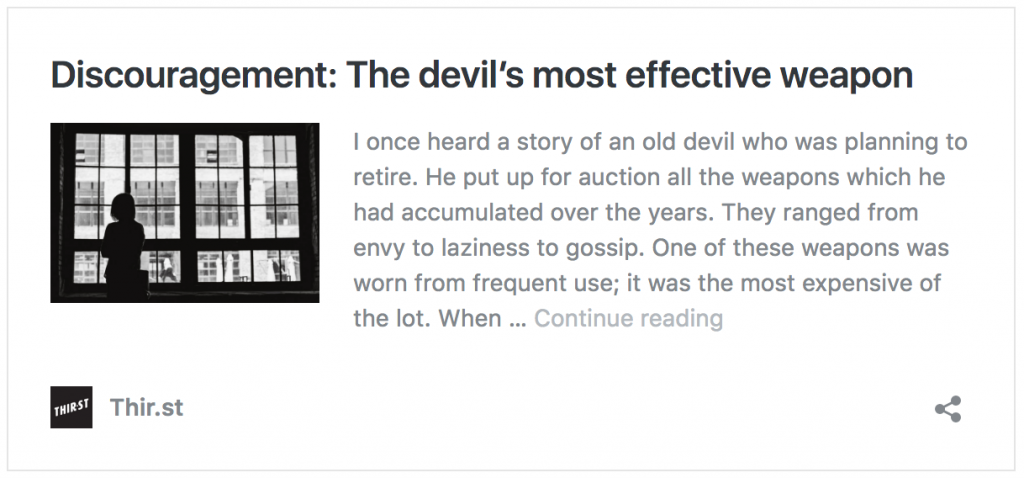Have you ever criticised your church?
Recently, a good number of my brothers and sisters-in-Christ — people who are close to me — are beginning to have their doubts about their churches on a number of issues. Some weeks it’s about something the preacher said. On another, it might be about a reckless choice of song during worship.
While it’s crucial to keep standards and be sensitive to audience feedback, upon reflection I honestly find that a lot of the criticism comes from a place of pride.
We all care for our church to varying degrees, but I find myself wishing more effort was spent on ensuring there’s edification and encouragement after a disagreement rather than a pat on the back for saying something theologically clever.
Because there’s always going to be something to disagree about, we need to learn how to disagree without causing dissension.
“If anyone teaches a different doctrine and does not agree with the sound words of our Lord Jesus Christ and the teaching that accords with godliness, he is puffed up with conceit and understands nothing. He has an unhealthy craving for controversy and for quarrels about words, which produce envy, dissension, slander, evil suspicions, and constant friction among people who are depraved in mind and deprived of the truth, imagining that godliness is a means of gain.” (1 Timothy 6:4)
Whether it’s theological differences or wrong song choices, there’s a great deal in the Church today with the potential to divide us if we let it. But there’s also a lot more common ground than we realise.
So how can we have unity without uniformity? How do we disagree within closed ranks? If we want to call ourselves a united body of believers, these are questions we must have answers to.
PRIDE AND POSTURE
Recently, I attended my church’s bi-annual camp in Malaysia. Going with a group of young people, it was actually my first time attending such a camp and I didn’t really know what to expect.
The camp turned out to be very heavily focused on family issues like marriage and fatherhood, so a lot of the singles quickly felt left out in terms of content and context.
By lunch, it had gotten to a point where I had been in multiple conversations about the sheer irrelevance of the sermons. That sort of conversation really fed into my bitterness about the camp. I worked my socks off last week to clear assignments, paid $500 and took a 9-hour coach ride to be here for this?
That attitude of mine lasted until the night service, where I repented for being so stuck up and insistent on my own way. As the speaker ambled up the stage, I told God quietly: “I know You didn’t bring me here to waste my time, and I don’t want to waste Yours. You have something here for me, and I really want to learn it. Help me to be humble as I listen.”
And everything changed after that. When I pressed in to learn humbly, something clicked. And I began to listen to what the speaker was saying — the importance of getting marriage and fatherhood right. And so I learnt.
My personal belief is that a lot of our reactions today stem from entitlement.
Marriage, fatherhood, motherhood and family are not things that singles get to ignore. In fact, until that night I was tempted to believe that holiness in the home was just something that happened once I got married.
Nothing could be further from the truth — it takes the real hard work of fathers to be the spiritual thermostat of their homes. It takes discipline and time today. As men, our spiritual disciplines and walk with God must be on point if we want to lead a godly family.
I can’t speak for my whole generation, but my personal belief is that a lot of our reactions today stem from entitlement. At least for younger Singaporeans, you want anything — you snap your fingers and there you have it. Instant gratification in just the way you desire. So I find that we tend to react poorly when we don’t get that.
We’ve gotta respond instead. When we encounter a situation we’re uncomfortable in, we need to stop complaining as the first recourse. I know how much I need to shut up for a second and ask God what He’s doing; I’m scared to think of how much wisdom I’ve missed out on just by merely dismissing it before I really hear it.
And if you know me, you’d know I have a very binary view on life, in that every decision either takes you closer to God or further away from Him. So the next time you start openly disagreeing with a sermon or song, check your posture. At the heart of it, do you just want to sound right? Do you just want people to agree with you?
Or do you really want to lovingly build up the body of believers God has put you in?
Unity is generally an easier thing when we agree. But do we want people to also end up closer to God even – especially – in our disagreements? At the bottom line, it’s all about the net kingdom profit.
HUMILITY AND HONOUR
What if you decide that unity is the highest value in your church?
What would your conversations sound like? How different would the way your ministries are run be?
Conversations either honour leaders or dishonour them. Conversations about members either respect them or belittle their concerns. Regardless, if they don’t have love in them, the harsh truth is they are just words meant to make you sound smart.
But if they are spoken in the love of God, they build up the church, its leadership and members.
“Above all, keep loving one another earnestly, since love covers a multitude of sins.” (1 Peter 4:8)
We don’t do honour very well, but we desperately need it. Especially when we disagree, we need to be able to have conversations that still encourage, edify and exhort. We are so frequently doing the very opposite, that Satan might as well recline on a deck chair given how terribly efficient we can be at his work.

We need to whip out Ephesians 4 a little more, and be mature enough to have conversations about the things we disagree with without being stumbled, or worse – stumbling others. Even if we don’t like a particular sermon, speaker or song, we need to be able to talk about these things in a way that still honours the brother or sister, that still allows for mutual edification and unity.
If it’s not mutual edification or unity, then it’s disunity and dishonour. And if you’re leader, you have the added responsibility with your words. The younger ones are looking up to you, and they will either watch your weekly disdain of the speaker or follow in the culture of honour you are making.
Look to make net kingdom profit.










